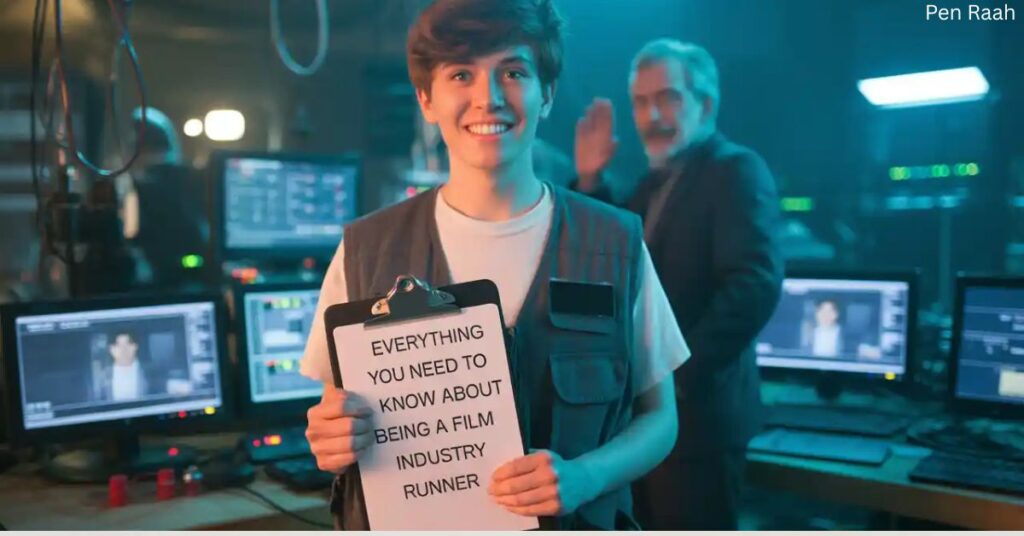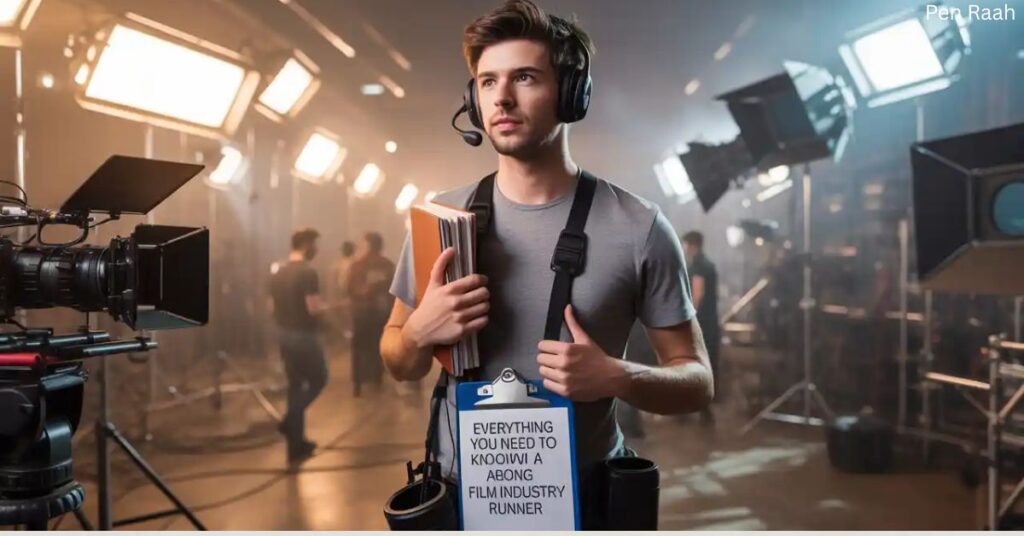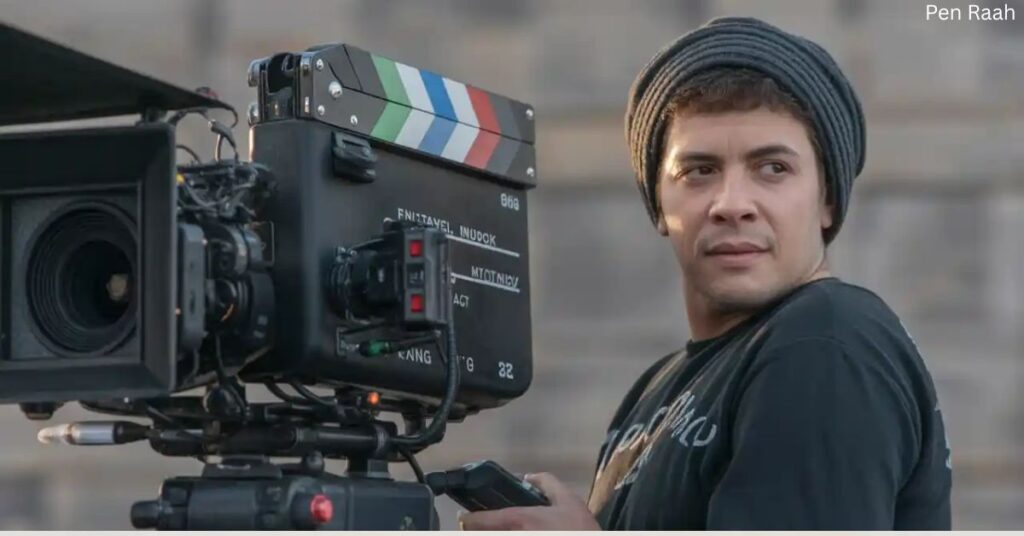A film industry runner plays a crucial role in supporting the production team on film sets. They handle various tasks, from distributing call sheets and scripts to running errands and assisting with daily operations. Often a freelancer, a film industry runner ensures that everything on set runs smoothly by managing office tasks, coordinating with the crew, and handling logistics like travel and accommodation.
Though considered an entry-level position, being a production runner opens doors to many opportunities within the film industry. With the right skills, such as excellent communication, multitasking, and reliability, runners can progress to higher positions, building a successful career in film production.

What is a Film Industry Runner?
A film industry runner is someone who works behind the scenes on a film set, supporting the crew in various ways. This position is essential to the production, as runners handle everything from distributing call sheets and scripts to running errands and making sure the crew has everything they need. They help with office tasks, like handling health and safety notices and ensuring that everything in the production office is in order.
Being a production runner means working in a fast-paced environment where no two days are alike. Whether it’s delivering items to the post office or ensuring the team is stocked up with caffeine and snacks, runners are often seen as the go-to people for getting things done on time. The role is typically held by a freelancer, meaning there’s flexibility, but also a need for great reliability.
Types of Runners in the Film Industry
Not all film industry runners do the same tasks. Depending on the specific project, there are different types of runners, each with their own unique responsibilities. The general production runner handles the day-to-day tasks, but specialized runners may take on specific roles. For example, a herald might be in charge of welcoming new cast and crew members, while a distributor ensures the smooth flow of script distribution and call sheets.
Other specialized runners might focus on more physical tasks. A removals expert would be responsible for transporting equipment and materials around the set, while a marshal organizes parking and traffic management. Regardless of the specific role, all types of runners are vital to the film set’s success.
Key Responsibilities of a Film Industry Runner
The responsibilities of a film industry runner vary day by day, but the core tasks remain the same. One of the most important duties is distributing call sheets, which detail the schedule for the day’s filming. Runners also manage health and safety notices to ensure everyone on set stays safe. Additionally, they may handle the delivery of documents, props, or scripts to various departments, ensuring nothing is overlooked.
Runners often play a crucial role in supporting the production office. This may include travel and accommodation bookings, organizing lunch or coffee orders, or assisting with general administrative duties. They are always the first to lend a hand when something needs to be done quickly. The ability to multi-task is essential for this position, as runners frequently juggle multiple requests at the same time.
Skills and Traits Required to Be a Successful Film Industry Runner
To succeed as a film industry runner, certain skills and traits are essential. The most important is taking instruction. Runners must listen carefully and execute tasks quickly, often under tight deadlines. Staying calm under pressure is also vital, as the production set can be chaotic. In addition to taking initiative and solving problems independently, communication skills are key when interacting with the rest of the production team.
A successful production runner must also be reliable. They need to be on time, as punctuality is crucial to keep the production on track. Multi-tasking is another key trait. Runners will often be assigned several jobs simultaneously, and prioritizing these tasks efficiently is critical for smooth operations. Having a passion for the film and TV drama industry helps, as it motivates runners to perform their best in such a dynamic environment.

Essential Tools and Equipment for Film Industry Runners
Every film industry runner needs to be prepared with the right tools for the job. Basic equipment includes Microsoft Office for creating and editing documents, such as call sheets or itineraries. A phone with map reading apps is essential for navigation around the set or the city, especially when running errands or delivering items. Additionally, having a car mount for the phone is helpful, as it allows for safe, hands-free driving while navigating between locations.
Runners must also have a notebook to take notes on tasks or deadlines. Having these tools at hand helps to stay organized, which is a necessity in the fast-paced film industry. The better prepared a runner is, the more smoothly they can carry out their duties.
Who Do Film Industry Runners Work With?
A film industry runner works with a wide range of people on set, from the production secretary to the line producer. They interact with crew members from different departments, including directors, actors, and production managers. Communication is key, as runners need to relay information between different teams and ensure that everyone has what they need to perform their tasks.
In large productions, the team can be quite extensive, including assistant coordinators who manage smaller tasks and production coordinators who ensure everything is running smoothly. The runner’s role is essential in keeping the communication flowing and supporting these individuals.
ALSO READ THIS POST: A Comprehensive Guide to YesMovies.to: Features, Alternatives, and Safety
How to Become a Film Industry Runner
Breaking into the film industry as a freelance runner is an exciting journey. The first step is to build the right skills and network with professionals in the industry. Having a passion for film passion and a strong work ethic is a great starting point. Many runners start with internships or entry-level positions to get their foot in the door.
Networking is a key factor in landing a job. Attending industry events, joining production teams on smaller projects, and even connecting with other runners on social media can help you get noticed. Building your reputation as a reliable production office runner can lead to more opportunities in the future.
Career Advancement: Moving Beyond the Film Industry Runner Role
After gaining experience as a film industry runner, there are numerous opportunities for career advancement. Many runners transition into higher roles, such as production assistant or production coordinator. These roles involve greater responsibility and may require additional skills, but they offer more opportunities for growth.
The skills learned as a freelance runner are transferable to other roles within the film industry. For example, a runner may eventually become a line producer, overseeing all aspects of production. With dedication, there’s plenty of room to grow within the industry, especially with the experience gained on set.
Challenges Faced by Film Industry Runners
While the role of a film industry runner is exciting, it also comes with its challenges. Long hours and a demanding schedule are common, as filming can take place at all times of the day or night. The job requires multi-tasking and sometimes working under high pressure, which can be stressful. However, these challenges also offer opportunities to develop a strong work ethic and resilience.
Working as a freelance runner can also mean dealing with uncertainty, as contracts are often short-term. The role can be physically demanding, requiring a lot of running around the set or between locations. Despite these challenges, the experience gained is invaluable for those looking to grow their careers in the film industry.
Key Industries Beyond Film for Runners
Though film industry runners typically work on sets, their skills are transferable to other industries. For example, event planning and large-scale concerts require similar organizational and logistical skills. Television production also offers similar roles for production runners, particularly in TV drama or reality shows.
Runners can also find opportunities in corporate video production or live event broadcasting. The ability to stay organized, manage multiple tasks, and support large teams makes a production runner valuable in a variety of settings outside traditional film production.

E-Learning Resources to Advance Your Skills as a Film Industry Runner
Online learning platforms offer a wealth of resources for film industry runners looking to improve their skills. Websites like Coursera and MasterClass offer courses on filmmaking, production management, and other industry-relevant skills. These courses provide valuable knowledge that can help production runners progress in their careers.
Additionally, learning by watching other professionals on set or seeking mentorship can be incredibly beneficial. A good understanding of tools of the trade like Microsoft Office and industry-specific software is a great asset. By continuously expanding your knowledge and skills, you can advance to more senior positions.
Career Opportunities in the Film Industry
The film industry is full of career opportunities beyond being a film industry runner. After gaining experience, many runners move into roles such as production coordinator, assistant coordinators, or production manager. These roles offer more responsibility, but they also come with better pay and career growth.
Runners can also explore opportunities in film festivals, television, and even digital media production. The variety of roles and projects in the industry means there is always room for growth and exploration, depending on where your interests lie.
Understanding the Role of a Runner in Various Film Production Settings
The duties of a production runner can differ depending on the type of production. On smaller projects, runners may take on a broader range of tasks, from delivering scripts to managing catering. In larger film sets, the responsibilities can be more specialized, with multiple runners working under different departments. Understanding these dynamics will help aspiring runners adapt quickly to various settings and increase their chances of success in the film industry.
Whether it’s a small TV drama or a major Hollywood film, the role of a runner is vital to the production’s success. Understanding the scope of your responsibilities and being flexible can ensure that you thrive in this fast-paced and rewarding environment.
FAQs
- What is a runner in the film industry?
A runner in the film industry is an entry-level position that supports the production team by handling various tasks like running errands, delivering scripts, and ensuring the set runs smoothly. - How much does a runner get paid?
The pay for a film industry runner typically ranges from $100 to $200 per day, depending on the project and location. - Do production runners get paid?
Yes, production runners are paid, often on a daily rate, but the amount can vary based on the production’s budget and the runner’s experience. - How to become a runner in the film industry?
To become a runner in the film industry, gain experience through internships, networking, and building a strong reputation for being reliable and adaptable on set. - What is the salary of a runner?
The salary of a film industry runner can vary, but it generally ranges from $30,000 to $45,000 per year for full-time roles, with variations based on experience and location.
